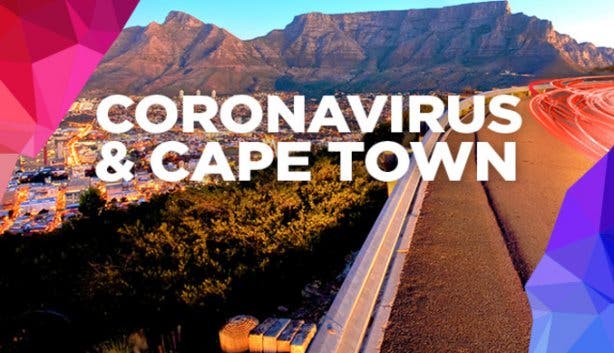![]() The hidden seaside bistro on the ...
The hidden seaside bistro on the ...
Inventive small plates best explored with a wine pairing


| For Moments of Joy. Follow our social channels for useful news, daily local champions | |
 | 072 350 2062 |
 | Ideas Cartel, The Old Foundry, 1 Sand Hill Road, Green Point |
 | www.capetownmagazine.com/subscribe |
 | now@capetownmagazine.com |
 | CapeTownMag |
 | CapeTownMagazine.com |
 | capetownmag |
Is there a cure? Can you get the virus more than once? These, and more, answered by the experts
Last updated: 24 June 2020
2020 has been a year of uncertainty for many, and during a time of crisis it is important to separate the facts from the myths. We’ve collected answers from credible sources and experts to bring you accurate information about what’s happening and how it affects your life. Find a list of coronavirus symptoms to look out for, how to self-isolate, how and where to get tested, the latest updates on treatments, vaccines, and the search for a coronavirus cure, and what the government is doing to contain the coronavirus.
IS THERE A CURE FOR THE CORONAVIRUS?
According to the World Health organisation, "to date, there are no specific vaccines or medicines for COVID-19. Treatments are under investigation, and will be tested through clinical trials."
There has been a breakthrough treatment that has been shown to reduce mortality rates by a third amongst patients who are on ventillators. Read more about the drug, Dexamethasone, which is also manufactured in South Africa.
WHAT IS COVID-19 AND WHERE DID IT COME FROM
Covid-19 belongs to the family of coronaviruses found in humans and animals. Other coronavirus cases are the Middle East Respiratory Syndrome (MERS-CoV), which first broke in 2012, and Severe Acute Respiratory Syndrome (SARS-CoV), which was identified back in 2003.
Covid-19 was first reported in Wuhan, China. The first case of the coronavirus in Cape Town was confirmed on 11 March 2020, five days after the virus first appeared in KwaZulu-Natal South Africa. The World Health Organisation declared the virus a pandemic on 11 March 2020, with over 100,000 confirmed cases of infection across 120 countries. That figure has continues to rise since.
In the video below, a representative from the National Institute for Communicable Diseases exaplins in more detail.
HOW IS THE VIRUS TRANSMITTED?
The World Health Organisation states that "the disease can spread from person to person through small droplets from the nose or mouth which are spread when a person with Covid-19 coughs or exhales". These droplets may land on a surface, or another person who can then "catch COVID-19 by touching these objects or surfaces, then touching their eyes, nose or mouth.
People can also catch COVID-19 if they breathe in droplets from a person with COVID-19 who coughs out or exhales droplets". This is why it is important to keep at least a 1.5m away from other people during this time, and to wash and santiase hands frequently.
WHAT ARE THE SYMPTOMS OF COVID-19?
According to the World Health Organisation (WHO) the most common symptoms of COVID-19 are fever, tiredness, and a dry cough.
Less common symtpoms include:
HOW LONG AFTER CONTACT WITH AN INFECTED PERSON DO SYMPTOMS SHOW?
The World Health Organisation states that "on average it takes 5–6 days from when someone is infected with the virus for symptoms to show, however it can take up to 14 days”.
WHAT SHOULD I DO IF I SUSPECT I HAVE COVID- I9?
According to local governement you shoul limit contact with people by self-isolating, and "contact the national hotline on 0800 029 999 or the provincial hotline on 021 928 4102 for advice on what to do next."
If you have severe symtpoms or shortness of breath, seek medical care immediately. Always call the medical facility before arriving to let them know you suspect the coronavirus.
SHOULD I GET TESTED?
Only a medical practitioner can answer this question, so if you have had flu-like symptoms, or been in contact with someone who tested positive, call the NICD Hotline on 0800 029 999 or the Provincial Hotline on 021 928 4102. Explain your symptoms, and indicate whether you have had contact with someone who tested positive. You will receive advice on what to do.
HOW MUCH DOES A CORONVIRUS TEST COST?
The South African Government News Agency has stated that, “public sector testing is free of charge”. However, “If going via a private lab, it is advisable to check with your medical aid to ascertain if they will cover the costs for the test”.
HOW CAN YOU PROPERLY SELF-ISOLATE AT HOME?
Professor Cheryl Cohen from the National Institute of Communicable Diseases explains everything you need to know on how to properly self-isolate at home.
SHOULD YOU BE WEARING A MASK?
Every person is required to wear a mask when leaving the house.
CAN YOU GET THE CORONAVIRUS MORE THAN ONCE?
There is simply no easy answer to this, as the virus is new and studies have yet to yield a definitive answer. Science writer Cathleen O’Grady wrote a National Geographic article about herd immunity and the coronavirus published on 20 March, 2020, in which she observes that “some reports describe reinfections of the novel coronavirus in people who tested positive again after they had already recovered. It’s not clear, though, that these are actually cases of reinfection—it’s more likely that they can be explained by people continuing to shed the virus for a long time, and that the level of virus shedding fluctuates over time.” Read the full article on the National Geographic website.
HOW IS THE GOVERNMENT CONTAINING THE SPREAD OF COVID-19?
On 23 March President Cyril Ramaphosa declared a nationwide lockdown in order to mitigate any further spread of the Covid-19 virus starting from Thursday 26 March at midnight to 16 April midnight. Lockdown was then extended, and different alert levels were introduced ot ease out of lockdown.
Read about the latest lockdown updates.
WHAT HAPPENS IF YOU BREAK THE RULES?
Failure to follow the rules could lead to a month imprisonment or a fine.
WILL PUBLIC TRANSPORT STILL OPERATE?
Public transport is operating under certain restrictions. Read all about how the lockdown and coronavirus outbreak is affecting public transport in South Africa.
CAN I TRAVEL OR MOVE ACROSS PROVINCIAL BORDERS?
Travel is currently only permitted for business travellers, and only with a permit. Read all about how the lockdown and coronavirus outbreak is affecting travel in South Africa.
---
Share in a moment of joy, and watch South Africans arrive home in song.
7 simple, fun and not too messy recipes to make with your kids in lockdown.
Find out more about how the coronavirus is affecting travel and transport in Cape Town.
To contain the spread of Covid-19 the city has closed public facilities and beaches.
Don’t miss out on all the moments of joy getting us through the coronavirus.
Try-out our list of things to do this weekend.
Keep up to date with Covid-19 updates and practical tips.
Check out this adorable miniature version of the 7de Laan set.
---
Use our events section for an up-to-date overview of what’s happening in the city, ‘burbs and dorpies. Join our newsletter and get quick access on the go by adding us to your mobile home screen for the ultimate guide to discoveries in Cape Town.
Follow and like us on Twitter ❤ Facebook ❤ LinkedIn ❤ Instagram ❤ Pinterest for updates.
![]() The hidden seaside bistro on the ...
The hidden seaside bistro on the ...
Inventive small plates best explored with a wine pairing
![]() Rum, brandy & gin tastings with your ...
Rum, brandy & gin tastings with your ...
Unusual cuts prepped in-house and a curious gin atomiser
![]() Reasons to visit this beach-side family ...
Reasons to visit this beach-side family ...
DIY waffles, loaded hotdogs, poke bowls, right on the beach
![]() Free beach clean-ups with the Two ...
Free beach clean-ups with the Two ...
It happens every single month. See upcoming dates
![]() HintHunt escape rooms for epic ...
HintHunt escape rooms for epic ...
6 immersive themes, one being the best in Africa
![]() Brewery with food specials (almost) ...
Brewery with food specials (almost) ...
Daily specials on comfort meals like burgers and schnitzels
![]() Meet 100 bronze life-size figures at ...
Meet 100 bronze life-size figures at ...
From famous heroes like Mandela to forgotten ones like Autshumato
![]() Team building, stylish conferencing & ...
Team building, stylish conferencing & ...
Ultimate work-play-and-stay hub, Trail’s End
![]() Car rental specials in Cape Town
Car rental specials in Cape Town
Free upgrades, free data, 10% off luxury vehicles & more
![]() Accommodation special at Cederkloof ...
Accommodation special at Cederkloof ...
Book for 4, pay for 2. There’s hot tubs, hiking trails, pools…
![]() Live music & craft beer at Woodstock ...
Live music & craft beer at Woodstock ...
Springbok Nude Girls and Arno Carstens play here. Plus the beer rocks
![]() Ficks, Hermanus’s tidal pool ...
Ficks, Hermanus’s tidal pool ...
Just as wonderful at night & during the cooler months
![]() The café creating space for ...
The café creating space for ...
It’s hidden in Hermanus. Here’s how to find it
4 days of cosplay, comics, competitions, celebrity meet & greets…